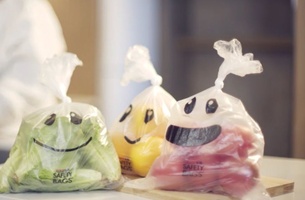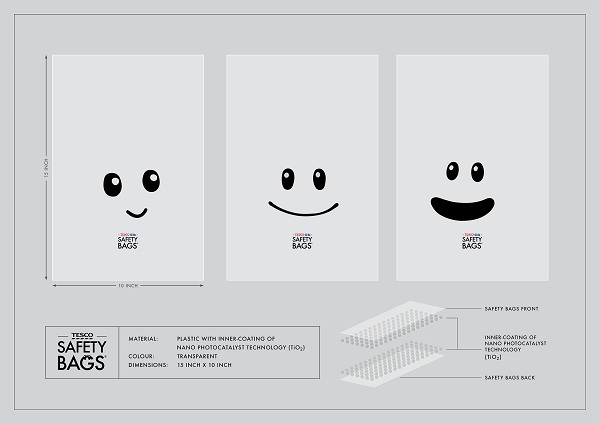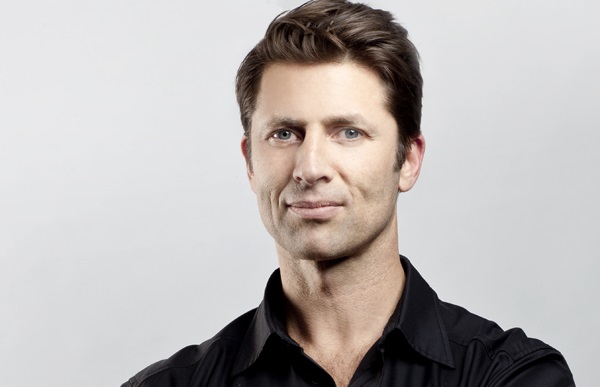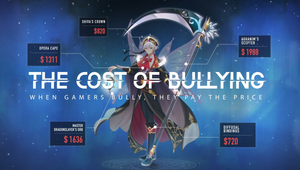
How Cheil Hong Kong Make Light Work of Innovative Product Design for Tesco

Earlier this year Cheil Worldwide Hong Kong launched ‘safety bags’ in flagship Tesco stores in China. The incredible little fruit and veg bags, look just like the ones we’ve had in supermarkets for years, except they have one very special difference. The bags contain a unique chemical coating, currently awaiting patent by Cheil, that destroys harmful pesticide residues on fruit and veg. By simply exposing the bags to either natural or synthetic light, the coating inside will begin to break down any residual harmful chemical compounds.
LBB’s Phoebe Siggins speaks to Cheil Worldwide Hong Kong ECD Paul Chan and Cheil Worldwide Global CCO Malcolm Poynton to find out how they made these potentially life-changing bags and why China was the market to do it.
LBB> To give some cultural background, how bad is the food safety problem in China?
PC> The food safety problem in China specifically, more so than Hong Kong, has been a long-standing problem. It’s the number one public health concern. Concerns over food safety has tripled in China since a famous milk crisis in 2008. 71% of Chinese people consider food safety to be the biggest major health concern in China, with pollution a close second. The country has basically faced one food safety concern after another – barely a year goes by without a high-profile scare. Not a year goes by without a scare and on top of all of that, Green Peace China did a recent study that showed up to 90% of all fruits and vegetables sold in supermarkets are contaminated with at least one harmful pesticide. This is yet another food scare scandal, on top of all of what China has had to deal with over the last decade.
LBB> How wary are the Chinese public when it comes to what they are eating?
PC> I think the whole of China’s trust in food safety has now absolutely plummeted. Consumers are now understandably quite worried about what they are buying. People tend to rely on specific places to buy their fruit and vegetables. It’s not great. If you look at the ramifications specific to contaminated supermarket fruits and vegetables they can be quite dangerous. Pesticide residues on fruits and vegetables puts people at risk of brain damage, neurological problems, even cancer.

LBB> Prior to this have there been any other big campaigns of initiatives to address food safety issues?
PC> On a government level, yes, but on a brand level, not that we know of. In 2015, the Chinese Government introduced a new food safety law and the idea was to regain China’s confidence in food safety and clean up the entire food supply chain. A part of that included increased punishments for those who violated the existing law. It also placed more responsibility on those who handled food all the way through the food chain, from the farm to the restaurants, to food store. But the reality is that China is a huge country with a massive number of farms, so enforcing the law is another thing. Following the food chain from start to end is nigh on impossible, so it takes time. On a brand level, a campa that allows shoppers to enjoy safer fruits and vegetables at the retail level, facing brands is first of its kind.
LBB> Why was it right for Tesco to address food safety and pesticide residues at that time?
Malcolm Poynton > Pesticides hit scale in the mid-to-late 60s and by the time the 70s came around, the use was global and widespread. Its only now that we live in a time where we understand the damage that pesticides do to our bodies. For the Chinese, the consequences have been absolutely dire and ultimately, inescapable. Amongst other food scandals trust was at an all-time low.
PC> It’s never a good time to tackle to big issues like food safety. Tesco saw the opportunity to lead by example, making a decision to tackle the issue head on. This campaign wasn’t about leading with a promo message or achieving sales. It’s all about raising awareness and helping customers enjoy safer fruits and veggies. It aims to fuel conversation about food safety and position Tesco as a brand striving to enhance the quality of life for its shoppers.

Paul Chan, Executive Creative Director, Cheil Worldwide Hong Kong
LBB> Were you concerned that by approaching this problem you might have highlighted an issue that people weren’t aware of about Tesco’s fruit and vegetables?
PC> The pesticide residue problem is already a known fact. Sometimes I think the only risk in business is if you don’t take any risks. So, Tesco made a decision to tackle the issue head on and lead by example. In doing so, we believe Tesco not only allow their customers to enjoy safer fruit and vegetables, but build brand affinity with them. This isn’t just to build respect for Tesco but to connect people with what they stood for. And we believe that connection, will build brand affinity more than an increase in sales or market share ever could.
LBB> How did you come to find out about the photocatalysis technology?
PC> Through curiosity. We knew that reducing or controlling pesticides across the entire food chain, from start to end, is next to impossible. We had to think laterally. After a lot of digging and research, we stumbled upon photocatalysis. That’s the method of breaking down chemical compounds using the power of light. We discovered that photocatalysis with titanium dioxide is proven to eliminate dust and destroy viruses, bacteria and toxic chemicals including pesticides. This technology was already being used in industrial paints, and windows, as well as commercial air conditioning units. So, we thought “is there a way we could apply this technology to the standard fruit and veggie bag that you find in the supermarkets?”. As this had never been done before we approached a leading photocatalysis laboratory and asked them whether it could be done. After a lot of testing, we finally managed to bring the two elements together.
LBB> Was the nanotechnology something that existed already also, or did you have to develop that yourself?
PC> We had to take the existing technology and turn that into nano-photocatalysis technology which is an even thinner layer than they have in the paint and air con.
LBB> So how does it work?
PC> You put your fruit and vegetables inside the bag, then expose that to natural light, indoors or outdoors, for three hours. The light reacts with the nano-photocatalysis technology into the bag destroying pesticide residues. You then remove the fruit and vegetables from the bag, rinse them and eat as you normally would.
MP> One of the things I love about this product is that these bags are kind of like magic. They are effortless for the consumer. You don’t have to do anything to make them work.

Malcolm Poynton, Global CCO, Cheil Worldwide
LBB> Am I right in thinking Cheil own the intellectual property for the bags?
PC> Yes, the invention of safety bags themselves are patent pending. So, we are waiting on that patent application number.
LBB> Is this something you hope to bring to more brands in China? Do you hope this is something that everywhere could use at some point?
PC> We are committed to Tesco, we have decided to launch safety bags as a beta tech launch at the flagship stores in China. Our beta test results will be completed at the end of August. Pesticide residue on fruit and veg isn’t just a problem in China, its worldwide. We hope to roll the bags out to Tesco stores globally in 2018.










